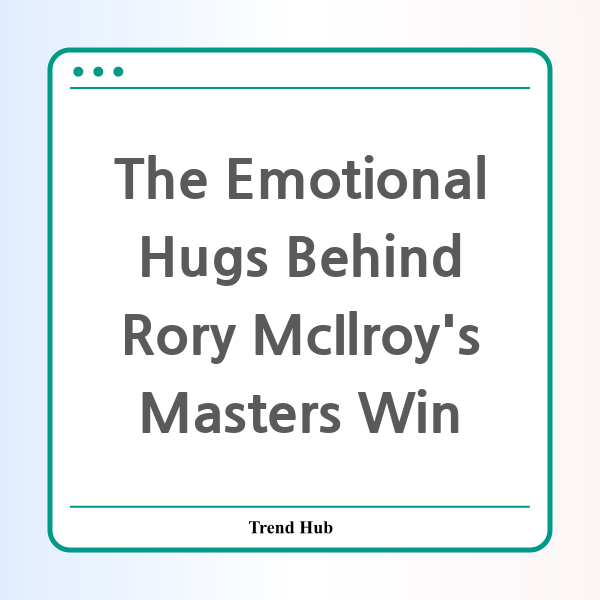* This website participates in the Amazon Affiliate Program and earns from qualifying purchases.

In the world of sports, few moments resonate as profoundly as those shared through the simplicity of a hug. This was especially true during the recent Masters tournament, where the emotional moments following Rory McIlroy's victory were not just celebrations; they were heartfelt connections that encapsulated the spirit of the game.
As McIlroy stood on the 18th green, the echoes of the crowd were matched only by the embrace he shared with his caddie, Harry Diamond. This was not merely a pat on the back but an affirmation of years of hard work, friendship, and shared dreams. In that fleeting moment, the pressures of the world faded away, and all that mattered was their collective journey to this pinnacle of success.
Traditionally, Masters Sunday is adorned with spine-tingling roars from the crowd, but it is also a stage for profound human connection. We recall past moments of intimacy like the iconic hug between Nick Faldo and Greg Norman in 1996, or the poignant embrace between Tiger Woods and his father, Earl. Each instance reminds us that behind every athlete's triumph lies a tapestry of relationships and emotional support that fuels their journey.
After McIlroy’s triumphant moment on the green, he continued to share hugs with those closest to him. The embrace he shared with playing partner Justin Rose, who suffered his own heartbreak after losing in a playoff, was particularly telling. It was a duality of elation and empathy, as McIlroy celebrated his win while also acknowledging a friend’s disappointment. This connection between competitors speaks volumes about the character of the players involved in this prestigious tournament.
Among the joyful moments was also the embrace with his wife, Erica, and their daughter, Poppy. This familial bond represents the foundation that supports elite athletes as they navigate the highs and lows of their careers. Winning a major championship like the Masters is not just an isolated achievement; it’s a culmination of sacrifices made by the player and their loved ones.
This shared experience extends to the wider golfing community, where players often share an understanding of the emotional weight of the moment. Justin Rose, reflecting on the day, stated the importance of recognizing the broader implications of such victories. It’s a reminder that golf, while often painted as a solitary pursuit, brings a rich tapestry of human emotion and connection to light.
As the tournament unfolded and the emotional hugs continued, other moments stood out, like the heartfelt exchanges between McIlroy and Kate Rose, Justin's wife. The unspoken bond between them spoke to the unique camaraderie shared among golfers and their families. In moments of victory, there exists a collective joy, but also an awareness of the poignant trials faced by fellow athletes.
McIlroy's win at the Masters was not just about wearing the green jacket; it was about the experiences and relationships that formed the backbone of his success. The hugs he shared were more than gestures; they were acknowledgments of the journey, camaraderie, and the emotional stakes tied to the sport. Each embrace symbolized the intertwining stories of triumph and defeat that define professional golf.
As we reflect on these moments, it becomes evident that the competition is as much about emotional intelligence and connection as it is about skill and performance. Through the lens of Rory McIlroy’s emotional victory, we see how the sport of golf thrives on human relationships, making these hugs not only memorable but essential to the narrative of the game. In the end, it's these connections that illuminate the path of success, reminding us that while the individual may take home the trophy, it’s the collective effort and support that truly creates champions.
* This website participates in the Amazon Affiliate Program and earns from qualifying purchases.